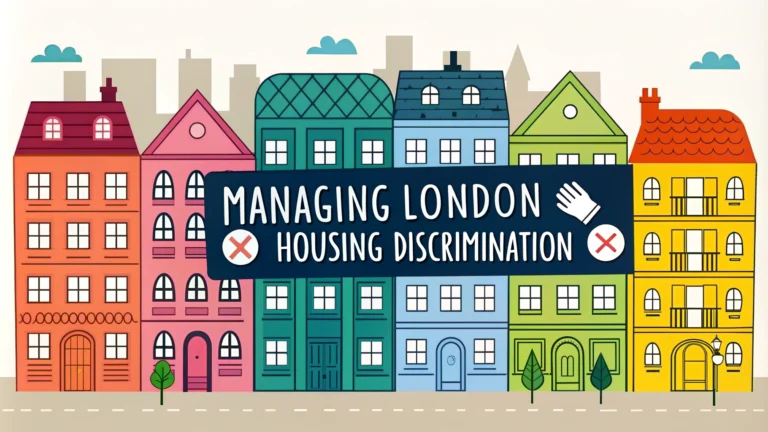Housing discrimination in London, while illegal, remains a persistent challenge for many residents and prospective tenants.
The Equality Act 2010 protects individuals from discrimination based on protected characteristics including race, religion, gender, disability, and sexual orientation.
This article outlines practical steps to identify, address, and report housing discrimination in London, along with resources for support.
Common Types of Housing Discrimination
- Refusing to rent based on protected characteristics
- Charging different rents or deposits to certain groups
- Providing different terms or conditions in tenancy agreements
- Limiting access to facilities or services
- Using discriminatory language in property listings
How to Spot Housing Discrimination
- Sudden property unavailability after revealing personal information
- Different requirements for viewing or applying
- Being told the property is “not suitable” without valid reason
- Receiving different rental terms than other applicants
Taking Action Against Discrimination
Document all interactions with landlords or agents, including dates, times, and content of conversations.
Keep copies of all correspondence, advertisements, and application materials.
Record any witnesses present during discriminatory incidents.
Where to Report Housing Discrimination
- Shelter Housing Helpline: 0808 800 4444
- Equality Advisory Support Service: 0808 800 0082
- Citizens Advice: 0800 144 8848
- London Borough Council Housing Teams (contact your local council)
Legal Support Options
Free legal advice is available through numerous organizations in London:
- Law Centres Network: www.lawcentres.org.uk
- Legal Aid Agency: www.gov.uk/legal-aid
- Housing Law Practitioners Association: www.hlpa.org.uk
Preventive Measures
- Research agents and landlords beforehand
- Use reputable property websites and agencies
- Keep written records of all interactions
- Bring a friend or witness to viewings
- Know your rights under the Equality Act 2010
Moving Forward After Discrimination
Consider joining housing advocacy groups to support systemic change:
- Generation Rent: www.generationrent.org
- London Renters Union: londonrentersunion.org
- Housing Rights Info: www.housing-rights.info
Next Steps for Support
Access immediate support through these verified channels:
| Organization | Service | Contact |
|---|---|---|
| Shelter | Emergency Housing Advice | 0808 800 4444 |
| Housing Ombudsman | Complaint Resolution | 0300 111 3000 |
| Rights of Women | Legal Advice for Women | 020 7251 6577 |
Building a Support Network
Creating connections with housing advocacy groups and fellow tenants can provide emotional support and practical assistance:
- Join local tenant associations
- Attend housing rights workshops
- Connect with community legal clinics
- Participate in housing advocacy campaigns
Documentation and Evidence Gathering
Essential Records to Maintain
- Written communications with landlords/agents
- Photographs of properties and conditions
- Witness statements and contact information
- Copies of advertisements and listings
- Records of phone calls and in-person meetings
Working with Legal Representatives
When seeking legal support, prepare the following:
- Chronological timeline of events
- Organized documentation package
- List of witnesses and their contact details
- Copies of all relevant correspondence
Creating Lasting Change in London’s Housing Market
Individual action combined with collective effort can help combat housing discrimination:
- Report all instances of discrimination to relevant authorities
- Share experiences to raise awareness
- Support housing rights organizations
- Advocate for stronger enforcement of housing laws
- Encourage transparent rental practices
Remember: Housing discrimination affects communities across London, but through awareness, documentation, and collective action, positive change is possible. Stay informed about your rights and don’t hesitate to seek support when needed.
FAQs
- What constitutes housing discrimination in London?
Housing discrimination occurs when a landlord, estate agent, or property owner treats someone unfairly based on protected characteristics including race, nationality, gender, disability, religion, sexual orientation, or age. - How do I report housing discrimination in London?
You can report discrimination to the Equality Advisory Support Service (EASS), your local council’s housing department, or seek assistance from Shelter. You can also file a complaint with the Property Ombudsman or take legal action through a solicitor. - What evidence do I need to prove housing discrimination?
Keep records of all communications, take screenshots of property listings, record dates and times of incidents, gather witness statements, and document any differential treatment. Email correspondence, recorded phone calls, and photographs can also serve as evidence. - What are my rights when moving to London as a foreigner?
You have the right to rent property if you have the legal right to be in the UK. Landlords must conduct Right to Rent checks but cannot discriminate based on nationality. You’re entitled to the same protections as UK citizens under the Equality Act 2010. - Can landlords refuse to rent to benefit recipients in London?
While some landlords do refuse benefits recipients, this may constitute indirect discrimination if it cannot be justified. Several court cases have ruled that blanket “no DSS” policies are unlawful. - What assistance is available if I face housing discrimination?
Free legal advice is available through Law Centres, Citizens Advice Bureau, and Shelter. The Legal Aid Agency may provide financial assistance for discrimination cases. Housing Rights Information and Advice Line offers specialized support. - How long do I have to make a discrimination claim?
You generally have six months from the date of the discriminatory act to bring a claim in the County Court under the Equality Act 2010. Time limits may vary for different types of claims. - What compensation can I receive for housing discrimination?
Compensation may include damages for financial loss, injury to feelings, and any additional costs incurred. Awards typically range from hundreds to thousands of pounds, depending on the severity and impact of discrimination. - Can a landlord refuse to make disability adaptations to a property?
Landlords must make reasonable adjustments for disabled tenants under the Equality Act 2010. They cannot unreasonably refuse permission for necessary adaptations, though tenants may need to fund these changes themselves. - What should I do if an estate agent is discriminating against me?
File a complaint with the estate agent’s company, report them to their professional body (such as RICS or NAEA), and contact the Property Ombudsman. Document all interactions and seek legal advice if necessary.







